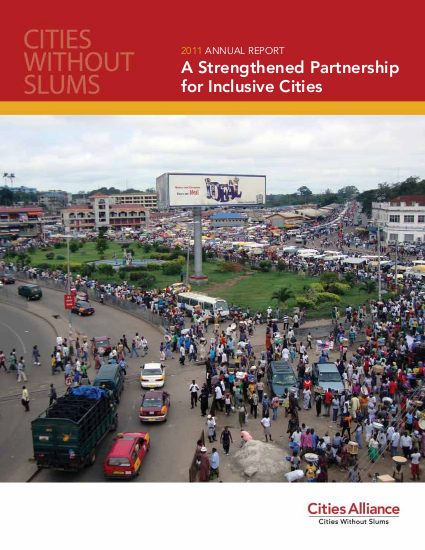
This report captures the end of the internal restructuring that has revitalised the Cities Alliance after its first decade. With the adoption of a new Charter and new business model in Mexico City last October, the Secretariat has spent the bulk of the past twelve months implementing these decisions, all of which have proven to be both resilient and strategic. in the same period, we have been solidifying the role of the Cities Alli- ance within the urban community at the World Bank, and have benefited enormously from a new dynamic and improved alignment. The Cities Alliance is now poised to move into a new phase in its short history, building upon its existing portfolio and experience. Amongst the most important challenges in the year ahead, i would identify the potential of the Catalytic Fund to dramatically improve the quality and the strategic impact of relatively small grants; the vital work of realising the very evident investment potential created by the Country Programmes; and the need to increase the impact of the Cities Alliance’s advocacy messages. Central to achieving all of these objectives will be the mobilisation of significant resources, the identification of new partners, and the leveraging of public and private sources of investment. As a global partnership, the Cities Alliance is particularly well placed to point to the gaps in national urban policies and in international development assistance. These include the need to focus on cities as a constituency, the vital importance of a more concerted and differentiated response to the needs of small and secondary cities—where the bulk of urbanisation will take place—as well as on the enor- mous, long-term and largely negative impacts that a badly managed urbanisation process will have on responding to global priorities, such as climate change. Even today, both national and international responses remain too disconnected. There are, however, positive developments that need recognition and support, including the dramatic recent movement towards a more meaningful and inclusive future in some of the cities in the Middle East and North Africa. And, in a different sphere, the increasing attention being paid by significant private sector players to the potential of cities of all sizes to provide new markets is an extremely welcome development that also demands our attention. As Manager, i would first like to thank all the staff of the Cities Alliance Secretariat who have managed to keep our work programme on track whilst also contributing so positively through a very challenging period. For the Cities Alliance as a whole, i would like to appreciate the very active role of the members of the Consultative Group for their active and critical support over a protracted period, and for creating the conditions for new and creative thinking. i would also like to acknowledge the role of the Executive Committee which has—in its new role—played a decisive role in designing a new platform for the Cities Alliance. Finally, i would like to thank Clare Short—Chair of the Cities Alliance Policy Advisory Forum—for her consistent support and unerring strategic vision, and Zoubida Allaoua, Director, Finance Economics and Urban department of the World Bank for her integrity, her support and her leadership.
Resource collections
- Coordination
- UN Habitat - Urban Response Collection
- Urban Response - Urban Crisis Preparedness and Risk Reduction
- Urban Response Collection - Community Engagement and Social Cohesion
- Urban Response Collection - Economic Recovery
- Urban Response Collection - Environment and Climate Change
- Urban Response Collection - Housing, Land and Property
- Urban Response Collection - Urban Crisis Response, Recovery and Reconstruction
- Urban Response Collection - Urban Resilience